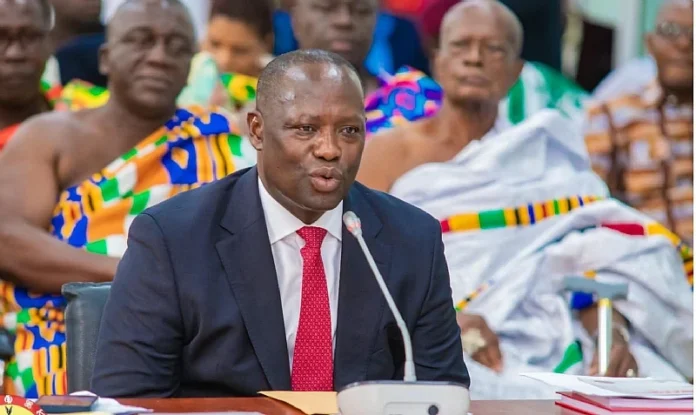The government has initiated moves to stop issuing prospecting licence for small-scale mining as part of measures to overhaul the mining sector.
The Minister of Lands and Natural Resources, Emmanuel Armah-Kofi Buah, said rather than issuing prospecting licences to prospective miners, which was open to abuse, the Ghana Geological Survey Authority (GGSA) would be resourced to undertake geological investigation for gold-rich lands, which would form the basis for the issuance of real licences.
“By the time I leave office as Minister for this sector, there will be no prospecting licence. People use prospecting licence to start digging for gold, and this is illegal, so we have to do away with it,” he stressed.
The Ellembelle Member of Parliament (MP) made the disclosure when he paid his first working visit to the Minerals Commission to interact with the staff and learn at first hand the operations of the Control Room for the monitoring of excavators.
He stressed that in line with the Resetting Ghana agenda of the government, there was the need to overhaul the licencing regime and operations of the Minerals Commission to be an effective regulator.
“The Minerals Commission is the regulator of the mining sector and must serve as an efficient policeman.
This is crucial because we are in a country where everyone is mad for gold and digging everywhere.
People must play by the rules so that there will be responsible and sustainable mining that protects our water bodies and forest reserves,” he said.
Mr Buah emphasised that unlike the current system where licence was issued from the national level, the government was committed to a bottom-up approach that made stakeholders at the local level, including chiefs, an integral part of the licencing process.
Context
The mining sector contributes significantly to the national economy and provides a source of livelihood to about five million people in Ghana. Last year, Gold raked in $11.6 billion, representing 56.3 of total receipts, according to the Ghana Statistical Service (GSS).
The small-scale sector accounted for $4.6 billion of the gold revenue, translating into 22 per cent of total receipts.
Despite the enormous role mining plays in the economic development of the country, the sector is plagued with challenges, particularly illegal mining. The illegal mining menace, known locally as galamsey, has led to the pollution of water bodies, degradation of large tracts of land, and depletion of forest reserves.
As a measure to stem the tide, the government recently revoked all licences issued for small-scale mining after December 7, last year, due to procedural breaches.
A committee has also been set up to review all existing small-scale mining licences to ensure that holders of those rights conduct their activities in accordance with the requirements of the licence.
Minerals Commission cautioned
Against that backdrop, the minister cautioned all officials of the Minerals Commission to shelve their political colours and put on professional and technical caps to help regulate the mining sector.
“The Ministry of Lands and Natural Resources is very important when it comes to mining, but the role of the Minerals Commission is even more critical to the regulation and enforcement of standards in the mining sector,” he said.
He stressed that the Minerals Commission would play a crucial role in projecting the government’s reset agenda in the mining sector.
The minister stressed that the Commission ought to align its operations with the vision of the government to help build a robust mining regime for the country.
“If there is anybody here that will stand in our way to reset the mining sector for the benefit of this country, the person should better find his way out.
“But as long as all of you do your work as professionals without bringing your party affiliations into your work, there is nothing to fear because I will ensure that you are not witch-hunted.
Assurance
The Chief Executive Officer (CEO) of the Minerals Commission, Martin Kwaku Ayisi, said the contribution of the mining sector to the national economy was significant and as such much attention should be paid to it.
He said the Commission would continue to discharge its responsibility in line with the vision of the government.
He said with 407 staff members spread across the country, the Minerals Commission would increase its field operations to ensure responsible mining.



